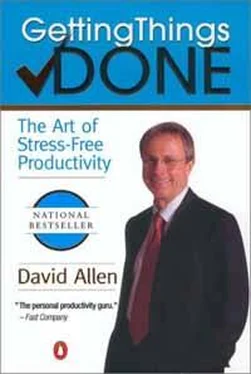My own interest has been in applying of the principle in terms of practical reality: Does it help get things done? And if so, how do we best utilize it in managing the work of our lives? Can we really use this information in ways that allow us to produce what we want to have happen with less effort? The answer has been a resounding yes.
Focus and the Fast Track
Over the years I have seen the application of the method presented in this book create profound results for people in their day-to-day worlds. As you begin to use it habitually as your primary means of addressing all situations—from processing e-mails, to buying a house or a company, to structuring meetings or having conversations with your kids—your personal productivity can go through the roof.
Many of the professionals I have worked with who integrated this method now find themselves experiencing enhanced or even new jobs and careers. These processes really work in the arena of the ordinary things we must deal with daily—the stuff of
our work. When you demonstrate to yourself and to others an increasing ability to get things done "in the trenches," you probably won't stay in the same trench for very long. [15] Of course, the people who are most attracted to implementing Getting Things Done are usually already on a self-development track and don't assume that they'll be doing the same thing a year from now that they're doing now, any-way. But they love the fact that this method gets them there faster and more easily.
It's been inspiring for me to learn and coach others how to deal with the immediate realities down where the rubber hits the road—and how to tie in the power of positive imagery to practical experiences in all our daily lives.
The "fast track" alluded to in the section heading above is a bit of misnomer. For some, slowing down, getting out of the squirrel cage, and taking care of themselves may be the major change precipitated by this methodology. The bottom line is it makes you more conscious, more focused, and more capable of implementing the changes and results you want, whatever they are.
"Create a way to regularly spend more time with my daughter" is as specific a project as any, and equally demanding of a next action to be determined. Having the vague, gnawing sense that you "should" do something about your relationship with your daughter, and not actually doing anything, can be a killer. I often work with clients who are willing to acknowledge the real things of their lives at this level as "incompletes"—to write them down, define real projects about them, and ensure that next actions are decided on—until the finish line is crossed. That is real productivity, perhaps in its most awesome manifestation.
The Significance of Applied Outcome Thinking
What I want to emphasize now is how learning to process the details of our work and lives with this clear and consistent system can affect others and ourselves in significant ways we may not expect.
As I've said, employing next-action decision-making results in clarity, productivity, accountability, and empowerment. Exactly the same results happen when you hold yourself to the discipline of identifying the real results you want and, more specifically, the projects you need to define in order to produce them.
Defining specific projects and next actions that address real quality-of-life issues is productivity at its best.
It's all connected. You can't really define the right action until you know the outcome, and your outcome is disconnected from reality if you're not clear about what you need to do physically to make it happen. You can get at it from either direction, and you must, to get things done.
As an expert in whole-brain learning and good friend of mine, Steven Snyder, put it, "There are only two problems in life: (1) you know what you want, and you don't know how to get it; and/or (2) you don't know what you want." If that's true (and I think it is) then there are only two solutions:
• Make it up.
• Make it happen.
We are constantly creating and fulfilling.
This can be construed from the models of yin/yang, right brain/left brain, creator/destroyer— or whatever equivalent works best for you. The truth is, our energy as human beings seems to have a dualistic and teleological reality—we create and identify with things that aren't real yet on all the levels we experience; and when we do, we recognize how to restructure our current world to morph it into the new one, and experience an impetus to make it so.
Things that have your attention need your intention engaged. "What does this mean to me?" "Why is it here?" "What do I want to have be true about this?" ("What's the successful outcome?") Everything you experience as incomplete must have a reference point for "complete."
Once you've decide that there is something to be changed and a mold to fill, you ask yourself, "How do I now make this happen?" and/or "What resources do I need to allocate to make it happen?" ("What's the next action?").
Your life and work are made up of outcomes and actions. When your operational behavior is grooved to organize everything that comes your way, at all levels, based upon those dynamics, a deep alignment occurs, and wondrous things emerge. You become highly productive. You make things up, and you make them happen.
The Magic of Mastering the Mundane
My clients often wonder how I can sit with them in their offices, often for hours on end, as they empty the drawers of their desks and painstakingly go through the minutiae of stuff that they have let accumulate in their minds and their physical space. Aside from the common embarrassment they feel about the volume of their irresponsibly dealt-with details, they assume I should be bored to tears. Quite the contrary. Much to my own surprise, I find it to be some of the most engaging work I do with -people. I know the release and relief and freedom that sit on the other side of dealing with these things. I know that we all need practice and support and a strong, clear focus to get through them, until we have the built-in standards and behaviors we need to engage with them as they demand. I know how significant a change these people may experience in their relationships with their bosses, their partners, their spouses, their kids, and themselves over the next few hours and (we hope) days and years.
It's not boring. It's some of the best work we do.
I'm in the focus business. As a consultant and coach,
Multilevel Outcome Management
I ask simple questions that often elicit very creative and intelligent responses from others (and even myself!), which can in turn add value to the situation and work at hand. People aren't any smarter after they work with me than they were before—they just direct and utilize their intelligence more productively.
The marry high-level idealistic focus to the mundane activity of life. In the end they require the same thinking.
What's unique about the practical focus of Getting Things Done is the combination of effectiveness and efficiency that these methods can bring to every level of your reality. There are lots of inspirational sources for the high-level "purpose, values, vision" kind of thinking, and many more mundane tools for getting hold of smaller details such as phone numbers and appointments and grocery lists. The world has been rather barren, however, of practices that relate equally to both levels, and tie them together.
"What does this mean to me?" "What do I want to have be true about it?" "What's the next step required to make that happen?" These are the comer-stone questions we must answer, at some point, about everything. This thinking, and the tools that support it, will serve you in ways you may not yet imagine.
Читать дальше











